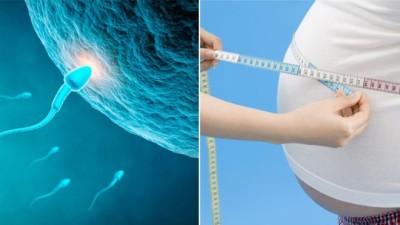A man’s weight affects the information passed on through his sperm and could leave his children predisposed to obesity, research in Denmark suggests.
The sperm cells of lean and obese men possess different epigenetic marks, maybe changing the behaviour of genes.
Dr Romain Barres, the author of the study, said: “When a woman is pregnant she should take care of herself.
“But if the implication of our study holds true, then recommendations should be directed towards men too.”
Part of the research – which was carried out by the University of Copenhagen and published in the journal Cell Metabolism – tested the sperm of six obese men who were undergoing weight-loss surgery.
Appetite control
It looked at the men’s sperm before treatment, a week after the surgery and then for a third time a year later.
Dr Barres said changes to the sperm were noticeable in the men a week after the surgery, and also one year on.
He said although the genetic make-up of the sperm cells was likely to remain the same, he noticed “epigenetic changes”, which could change the way a gene expresses itself in the body.
Dr Barres admits a definitive scientific conclusion for how these epigenetic changes affect the gene is not yet scientifically known.
However, the sperm cell changes he recorded are linked to the genes known for appetite control and brain development.
The five-year study also recorded similar sperm cell changes when it compared 13 lean men – who all had a BMI of below 30 – with 10 moderately obese men.
‘Significant differences’
Dr Barres said his findings have also been corroborated on mice and rats.
He goes on to suggest that there are possible evolutionary reasons why information about a father’s weight would be valuable to offspring.
His theory is that during in times of abundance, it is an instinctive way to encourage children to eat more and grow bigger.
“It’s only recently that obesity is not an advantage,” he said. “Only decades ago, the ability to store energy was an advantage to resist infections and famines.”
Prof Allan Pacey from the University of Sheffield, described the study as “interesting” and said it provided further evidence to support the theory that some characteristics can be passed by sperm, without altering the basic structure of the genetic code.
“Whilst the study examines a relative small number of individuals, the fact that such significant differences can be found in the epigenetic markers of lean and obese men is intriguing and in my opinion worthy of more detailed investigation,” he said.
“Until we know more, would-be parents should just aim to be as healthy as possible at the time of conception and not be drawn to faddy diets or other activities in order to try and influence the health of their children in ways we don’t properly understand.”
END


Be the first to comment